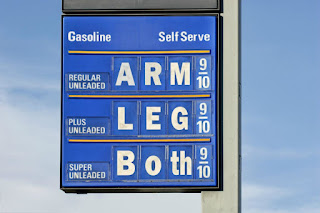Attention all chiropractors and physical therapists! Please report immediately to the state Capitol to treat the sore muscles of lawmakers who’ve twisted themselves into a pretzel, patting themselves on their backs for cutting the gasoline tax!
What a surprise (in an
election year) that lawmakers voted unanimously to cut the gasoline tax 25
cents a gallon from April 1 – June 30th. What a massive sense of relief for
money-short taxpayers to save, what, $25 per car this spring. Wow!
Let’s all drive to Disneyworld.
And what do you think will
happen in June when summertime driving season really kicks into high gear. Who’ll have the guts to vote against a
probable extension of the tax cut heading into campaign season, even if gas
prices have dropped by then?
While the savings may be tiny
for each driver, the loss of tax revenue for the Special Transportation Fund
(STF) will be significant… about $90
million. That
loss will be made up from other budget surpluses in Hartford which seems to be
awash with taxpayer money.
In addition to the gasoline
tax cut, we can all go on a spending spree with a sales tax holiday on clothing
the week before Easter, but only on duds and footwear priced at less than $100…
assuming it’s in stock, given the supply chain mess.
One group that will benefit
from this bipartisan bounty will be bus riders.
They’ll literally get a free ride for three months. Those folks deserve a break, as for them even
the existing $1.75 fare adds up and represents more of their income than most
commuters.
As for the Gold Coast fat-cats
who ride Metro-North… let them eat cake.
No fare cuts for you beyond the railroad’s recently announced discount deals
trying to entice riders back to the office.
This isn’t the first time our
lawmakers have messed with the gas tax. Some
of us remember 1997 (when Transportation Committee Senate Chair Will Haskell
was literally in diapers) when the tax was cut 14 cents a gallon. That costing
the STF billions in money that could have kept our roads and rails in better
shape.
What is really needed is what
lawmakers refuse to do: fix the state’s
gasoline price-fixing oligopoly known as “zone
pricing” that creates huge disparities in what the
pump price is based solely on geography.
Why does gasoline cost 40 cents a gallon more in Greenwich than
in Bridgeport?
And when, oh when, will we
stop focusing on internal combustion vehicles draining our wallets and
polluting our air? When will we get
serious about getting low m.p.g. junkers off the road, replacing them with
clean, electric power?
When? When we replace our part-time pols with full
time legislators.
That’s why I enthusiastically
endorse the idea of a pay
raise for our lawmakers. Their current $28,000 salary is a joke,
leaving them fudging
their travel expenses to scrape by, hoping to eke
out a fatter pension.
Legislators’ jobs may be part
time, but their responsibilities are full time plus OT, not to mention the
commute. At today’s pay scale only the
rich can afford to do the job which hardly means they represent, let alone can identify
with, their diverse constituents.
You get what you pay for. Connecticut deserves full time, well paid
lawmakers not the clown-car of political pandering we have now.








